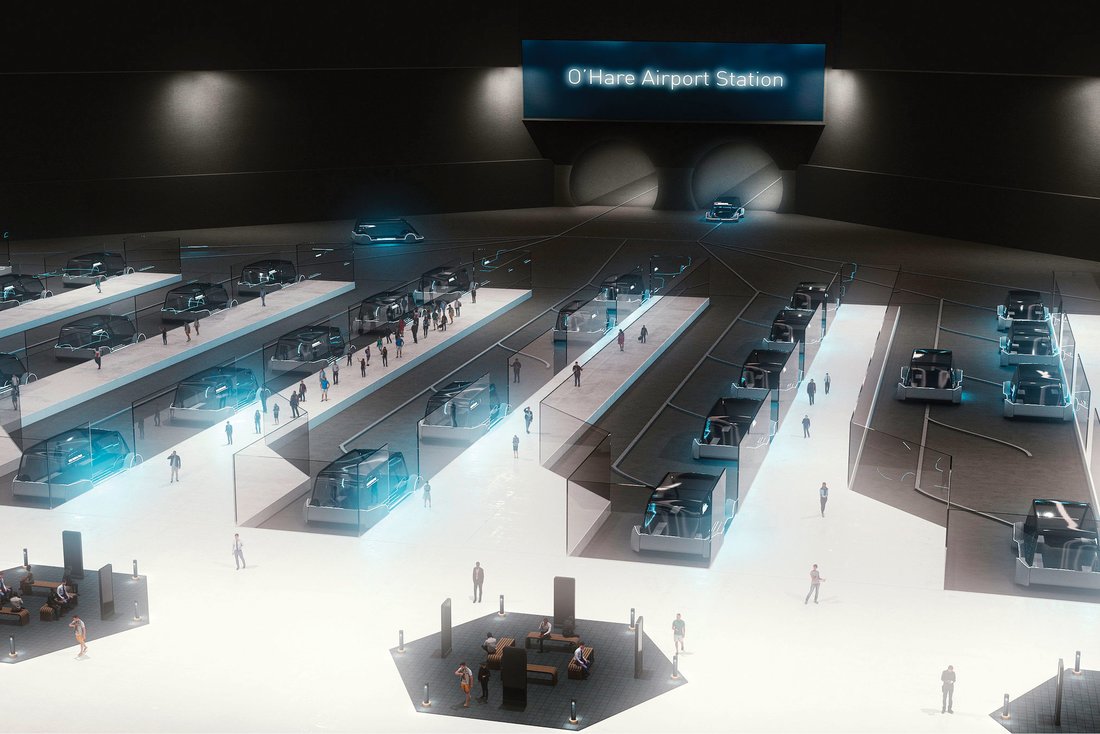馬斯克最激動(dòng)人心的公司名叫“無(wú)聊”
|
在洛杉磯西部溫暖的瀝青路、堵塞的交通和搖曳的棕櫚樹(shù)之下,埃隆·馬斯克正在尋找答案。在那里,一架名為“戈多”(Godot)的機(jī)器可能很快就要在405號(hào)州際公路下面挖出一條2.7英里的隧道。這條公路可是讓洛杉磯穩(wěn)居全美最擁堵城市寶座的重要因素。 這條隧道目前正在等待施工許可,洛杉磯人可能還要等些時(shí)間才能看到它的完工(就像《等待戈多》里的弗拉季米爾和愛(ài)斯特拉岡一樣)。但忙于在電動(dòng)汽車廠商特斯拉(Tesla)和太空設(shè)備公司SpaceX擔(dān)任首席執(zhí)行官的馬斯克需要證明一些事情。現(xiàn)實(shí)上看,他作為貝萊爾區(qū)(Bel Air)的居民,希望更方便地去往位于南部的霍索恩、距家17英里的SpaceX園區(qū)。而理論上看,馬斯克希望證明地下的超音速公共交通不是未來(lái)主義的幻想,而是幫助那些美國(guó)最繁忙(資金也最緊缺)的大城市排憂解難的現(xiàn)實(shí)方案。 看看馬斯克這家起名獨(dú)特的“無(wú)聊公司”(Boring Company,Boring也有鉆孔的意思——譯注)。它宣布了連接巴爾的摩和華盛頓特區(qū)(相距35英里),以及芝加哥城區(qū)和奧黑爾國(guó)際機(jī)場(chǎng)(O’Hare International Airport)(相距17英里)的計(jì)劃。芝城的Chicago Express Loop承諾單程用時(shí)僅需12分鐘——這大大縮短了路上的時(shí)間,根據(jù)采用的交通工具不同,現(xiàn)在這一段路往往需要25到90分鐘。這家Loop公司——不要把它與Hyperloop弄混,后者的速度更高、更有地區(qū)性——宣稱他們的電磁運(yùn)輸倉(cāng)可以搭載16名乘客,最高時(shí)速可以達(dá)到每小時(shí)150英里。按照計(jì)劃,運(yùn)輸艙的發(fā)車間隔為30秒到2分鐘,單向的運(yùn)送量可以達(dá)到每小時(shí)近2,000人。 不過(guò)Boring Co.帶來(lái)的不僅是技術(shù)。與其他類似規(guī)模的城市項(xiàng)目不同,這個(gè)芝加哥的項(xiàng)目不需要任何政府資金的支持:Boring Co.承諾完全依靠私募基金來(lái)承擔(dān)這個(gè)很可能耗資數(shù)十億美元的項(xiàng)目。由于芝加哥市開(kāi)始征詢提案,該計(jì)劃得到了官員的完全首肯,這與處于法律邊緣地帶的洛杉磯和華盛頓特區(qū)項(xiàng)目完全不同。這讓Chicago Express Loop成為了Boring Co.贏得的第一個(gè)巨大勝利,這也是公司迄今為止從城市政府那里獲得的最強(qiáng)有力的許可,它可能成為公共基礎(chǔ)設(shè)施未來(lái)發(fā)展的新方式。 |
UNDER THE WARM ASPHALT of West Los Angeles, beneath bumper-to-bumper traffic and swaying palm trees, Elon Musk is searching for answers. There, a boring machine named Godot may soon grind away at a 2.7-mile tunnel to run below Interstate 405, a key reason that L.A. retains its crown as the U.S. city with the worst traffic. The tunnel currently awaits a permit, and Angelenos may be waiting a while before it’s complete. (Paging Vladimir and Estragon.) But Musk, who spends his days juggling CEO roles at electric-auto maker Tesla and aerospace outfit SpaceX, has something to prove. Practically speaking, the Bel Air resident wants easier transit between his homes and the SpaceX campus in Hawthorne, 17 miles to the south. From a theoretical standpoint, Musk hopes to demonstrate that subterranean, supersonic public transit isn’t just a futuristic fantasy but a realistic solution for what ails many of America’s busiest (and most cash-strapped) metropolises. Enter Musk’s cleverly named Boring Company. It has announced projects to connect Baltimore with Washington, D.C. (a 35-mile span), and downtown Chicago with O’Hare International Airport (a 17-mile stretch). In Chitown, the Chicago Express Loop promises to ferry passengers from one end to the other in 12 minutes—far less time than the usual 25 to 90, depending on the mode of transportation. This Loop—not to be confused with Hyperloop, an ultrafast, regional version—boasts electromagnetic pods that each fit 16 passengers and can reach speeds of 150 miles per hour. It plans to transport nearly 2,000 people an hour in each direction, with cars departing every 30 seconds to two minutes. But it’s not just technology that the Boring Co. is bringing to the table. Unlike other urban projects of this size, no government funding is necessary to realize the Chicago project: The Boring Co. promises to privately fund the entirety of what will likely be a multibillion dollar effort. And thanks to a City of Chicago request for proposals, the plan has a complete go-ahead from officials—unlike the L.A. and D.C. projects, which face some time in legal limbo. That makes the Chicago Express Loop the Boring Co.’s first sizable victory and strongest validation from a city government to date, in what could be a path forward for future advancements in public infrastructure. |

|
德保羅大學(xué)(DePaul University)查迪克都市發(fā)展研究所(Chaddick Institute for Metropolitan Development)的主任喬·斯威特曼表示:“讓我們面對(duì)現(xiàn)實(shí)吧,由聯(lián)邦政府資助的城市鐵路項(xiàng)目短期內(nèi)不太可能回暖了。各城市需要自給自足,因此它們需要保持開(kāi)放的心態(tài),與私有企業(yè)攜手合作,這點(diǎn)十分關(guān)鍵。” 美國(guó)的大城市長(zhǎng)期面臨著資本投資不足的狀況。預(yù)計(jì)到2045年,每天穿梭于機(jī)場(chǎng)和市中心之間的旅客將達(dá)到3.5萬(wàn)人。芝加哥別無(wú)選擇,只能借助私營(yíng)企業(yè)——利用馬斯克——來(lái)彌補(bǔ)運(yùn)力缺口。不過(guò)The Transport Politic的城市規(guī)劃專家約拿·弗里馬克警告稱,把公共項(xiàng)目交給私人也有風(fēng)險(xiǎn)。以芝加哥為例,居民對(duì)Boring Co.項(xiàng)目的技術(shù)和經(jīng)濟(jì)可行性就一無(wú)所知。 弗里馬克表示:“公共部門(mén)允許公司推進(jìn)這個(gè)項(xiàng)目,卻沒(méi)有真正考慮公眾的想法。對(duì)于想要參與自身社區(qū)未來(lái)交通建設(shè)的人群來(lái)說(shuō),這一點(diǎn)值得擔(dān)憂。” 另外,監(jiān)管的障礙和政府的要求,例如環(huán)境分析和聽(tīng)證制度,又導(dǎo)致Boring Co.在加利福尼亞和馬里蘭的項(xiàng)目停滯不前。斯威特曼表示:“信號(hào)系統(tǒng)、利用這些工具運(yùn)送人類所需的聯(lián)邦許可、深度挖掘時(shí)所需的電梯和通風(fēng)井——這些都是需要解決的重大問(wèn)題。”(Boring Co.拒絕對(duì)此發(fā)表評(píng)論。) 不過(guò)馬斯克仍然會(huì)勇往直前。如果他能在芝加哥獲得成功,美國(guó)各地的官員可能都會(huì)愿意來(lái)一次類似的信仰之躍。畢竟,如果馬斯克都可以發(fā)射火星探測(cè)器了,那搞定朋友之間的這一點(diǎn)基巖又有多難呢?(財(cái)富中文網(wǎng)) 本文的另一個(gè)版本登載于《財(cái)富》2018年8月1日刊,題為“埃隆·馬斯克最激動(dòng)人心的公司名叫‘無(wú)聊’”。 譯者:嚴(yán)匡正? |
“Let’s face it—federal support for urban rail projects is not likely to bounce back anytime soon,” says Joe Schwieterman, director of DePaul University’s Chaddick Institute for Metropolitan Development. “Cities will be left to fend for themselves, making it critical that they remain open to private-sector collaboration.” Major U.S. cities face a chronic shortfall in capital investment dollars. With 35,000 daily passengers projected to move between the airport and downtown in 2045, Chicago is left with little choice but to leverage the private sector—and take a chance on Musk—to fill mobility gaps. But there are risks to placing public projects in private hands, warns Yonah Freemark, the urbanist behind The Transport Politic. In Chicago, for example, residents remain in the dark about the technical and economic feasibility of the Boring Co. project. “The public sector is allowing the company to move forward with this project without actual consideration from the public,” Freemark says. “That should be concerning for people who want to be involved in the transit future of their communities.” Elsewhere, regulatory hurdles and governmental requests—such as for environmental analysis and public hearings—have stifled the progress of Boring Co. projects in California and Maryland. “The signal systems, federal approvals required to put people on these vehicles, and the need for elevators and ventilation shafts when digging long distances beyond the surface—those are really big questions that are going to need answers,” Schwieterman says. (The Boring Co. declined to comment.) Still, Musk bores ahead. If he is successful in Chicago, elected officials across the country might be inclined to take a similar leap of faith. After all, if Musk can shoot for Mars, what’s a little bedrock between friends? A version of this article appears in the August 1, 2018 issue of Fortune with the headline “Elon Musk’s Most Exciting Company Is Boring.” |













